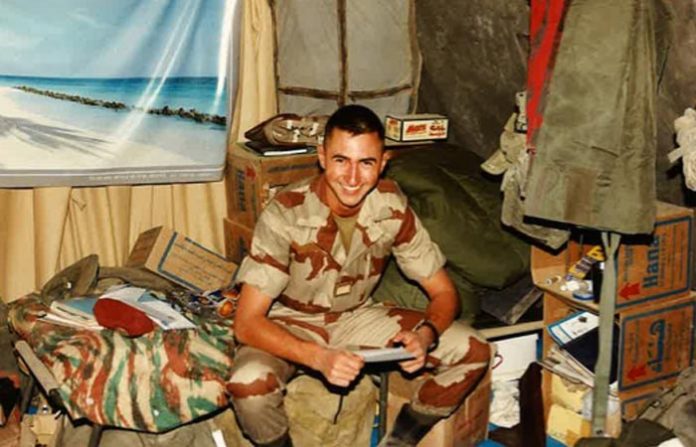General Michel Delion
What was your mission during Operation Daguet?
I was executive officer of the 4th battery of the 35th Airborne Artillery Regiment of Tarbes, ground-to-air defense unit. We were equipped with the brand new MISTRAL missiles as well as short-range detection radar. Our mission was to defend units of the Daguet Division against any enemy air threat, plane or helicopter (drones were no threat then). We were engaged in the fall of 1990, by sea, then by road via Yambu, with two airborne firing platoons, gradually reinforced by our brothers in arms from other artillery regiments (11th RAMa and 68th RAA).
At the end of February 1991 we contributed to the liberation of Kuwait by attacking towards the North, covering the West flank of the Coalition. We even reached the Euphrates river.
Describe a highlight of this campaign?
For our generation, the duration of the campaign itself was unusual. I remember numerous highlights. After several months living in the desert at a forward operating base on the Hafar-Al-Batin side, we rejoined our assault base in the far west of the Allied force. Our first target at the end of February, after crossing the border, was As-Salman Airport. I remember three particularly intense images: Mid-February, a heavy rain of bombs dropped by the American B-52s that we observed with our binoculars.

We were on the south side of the border, at the foot of a rocky escarpment which at the time seemed difficult to us to cross because it was particularly favorable on the defensive for the benefit of our enemy; On February 24, the endless flow of combat vehicles on the few drivable lanes going north, which gave off an incredible sense of power and invincibility; Finally, in mid-March, when I arrived in Kuwait city, the image of the airport frozen in time, on 2 August, 1990, with planes destroyed on the runway and the flight schedule that I had the chance to take a picture of.
Did you enter Kuwait? What were your impressions?
I arrived by military flight in Kuwait shortly after the liberation on a short mission for the French Embassy. During the descent before landing, I felt an unprecedented atmosphere: the sky was obstructed by black clouds, which was amplified by thick smoke coming from the burning oil wells. On the road between the airport and the French embassy, traces of the fighting were still clearly visible, mixing soldiers and equipment, including battle tanks.
Upon arrival at the French Embassy, I felt like it was ‘mission accomplished’. I looked back at these long months of waiting before the offensive, at this speed offensive, then at the memory of comrades from all nations who had fallen fighting to liberate Kuwait.

What did you learn from this campaign that proved useful takeaways for the rest of your career?
After two first experiences in Central Africa and in Chad, where I had had a first glimpse of life in the desert, then liberation of Kuwait, I was then engaged several times in the Balkans for peacekeeping operations or for combat missions.
The large-scale campaign to liberate Kuwait impressed me considerably for the rest of my career, helping me understand the scale and complexity of large coalitions. It was particularly valuable for me when I completed the Staff College (Ecole de Guerre), and when I had commanding positions or when I was in charge of teaching senior officers of the Army, including those of friendly and allied countries.
I had also discovered the Arabic world and culture. In subsequent contacts with officers from various countries of the Arabian Peninsula, I have always enjoyed talking to those who wore the commemorative medals of this campaign.
What are your current responsibilities?
A major general, I am Director of the French Army Command Doctrine and Education Center. As such, I am in charge of developing future studies and doctrine studies related to air-land combat, which amounts to training approximately 2,000 officers students per year. I am devoted to disseminate French military thinking.
I am in charge of Army military history and lessons learned. I have a special interest in strategic studies as I wrote a doctoral thesis (PhD) dealing with ‘the history of tactical military thinking’. I am going to take part with great pleasure in the various conferences organized in France to commemorate the 30 years of this campaign.















